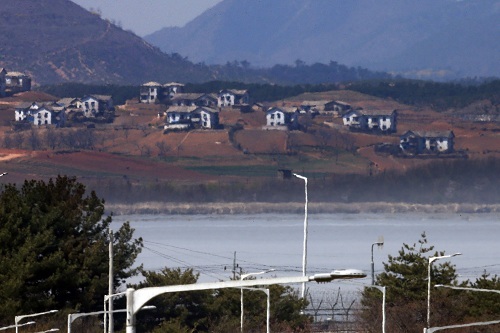A ranking official at North Korea’s military spy agency and two diplomats working outside the country have defected to the South, the government confirmed Monday, days after the joint arrival here of 13 workers from a North Korean restaurant in China.
The colonel-level intelligence officer came to Seoul last year and gave a “detailed testimony” on the Reconnaissance General Bureau’s espionage operations against the South, Yonhap News Agency reported, citing an unnamed source with knowledge on the inner workings of the communist state.
 |
(Yonhap) |
Additionally, a diplomat in his 50s who oversaw economic affairs at the North Korean embassy in an African nation arrived here last May along with his wife and two sons due to “life-threatening” concerns, according to the Donga Ilbo daily. Another North Korean diplomat in an Asian country sought asylum in February as Pyongyang was moving to cut and call in the staff at overseas diplomatic missions.
“There is truth to the reports, but I can’t speak about their identities or other details at the moment,” Unification Ministry spokesperson Jeong Joon-hee said at a news briefing.
Defense Ministry spokesman Moon Sang-gyun also said: “I can confirm the facts. ... But as the issue is being dealt with by the National Intelligence Service and the Unification Ministry, my comments on the detailed background will be limited.”
The revelation came three days after the Unification Ministry unveiled that a group comprising a male manager and 12 female servers of a North Korean restaurant landed in Seoul on Thursday.
Beijing’s Foreign Ministry, which initially refused to comment, confirmed Monday that 13 North Koreans who formerly resided in China flew last Wednesday “with valid passports,” saying their departure was “legitimate.”
The latest revelations gained traction due to their relatively high social status, minimum middle-class background and overseas experience that had likely allowed them easier access to South Korean culture and outside information.
In particular, the intelligence agent appears to be of the highest rank among known military defectors, equivalent to a two-star general in the South Korean military.
Launched in early 2009 by incorporating three military and party reconnaissance offices, the RGB is a key military organ trusted by leader Kim Jong-un and presumed to have orchestrated a series of GPS jamming and other attacks against the South.
It had long been led by Kim Yong-chol, a hard-line military commander who is believed to be the mastermind behind Pyongyang’s deadly sinking of a South Korean corvette in 2010 and now serves as director of the United Front Department and a secretary of the Central Committee of the ruling Workers’ Party in charge of cross-border affairs.
But controversy persists over Seoul’s rare verification of the exiles, coupled with last Friday’s announcement, which deviated from its longstanding principles that any defectors be brought in through a low-profile operation and that it neither confirms nor denies their arrivals.
Though officials repeatedly emphasized the latest cases as extraordinary, some critics pointed to the timing, accusing the Park Geun-hye administration of attempting to sway the April 13 general election by taking credit for the defections as the fruits of its ongoing sanctions push.
Seoul launched a campaign last February to dissuade citizens from using any profit-making North Korean facilities abroad while upping unilateral sanctions targeting the regime’s financial and shipping networks in response to its recent nuclear and missile tests.
On Sunday, the foreign and unification ministries held a background press briefing separately on the same theme: the effects of the sanctions against the North. The Unification Ministry voluntarily released the testimonies and a blurred photo of the 13 people, skipping an intra-agency questioning and other procedural steps. Moon’s remarks on the RGB official also represented the Defense Ministry’s first-ever confirmation regarding the defector issues.
In reality, many North Korean restaurants across the globe have for years been struggling to keep afloat in the face of sour public sentiment toward the regime’s nuclear ambitions, according to diplomatic sources, though signs have been indicated that their hardship has deepened since the international and individual sanctions took effect.
Further, the disclosure could pose a threat to other would-be refugees and those already on their journeys, especially given that several other North Koreans had reportedly worked alongside the 13. A top Unification Ministry official indicated during the briefing that some other left-behind colleagues may be seeking to follow suit, or on their way here now.
Cheong Wa Dae spokesperson Jeong Yeon-kuk denied another news report that the presidential office had ordered the ministry’s news conference, calling it “groundless.”
The main opposition The Minjoo Party of Korea criticized the government for breaching the standard procedure and posing risks to the safety of the defectors’ families in the North.
“After all, it is difficult to quell speculation that the government arranged an unplanned announcement to consolidate the conservative forces ahead of the election by once again inciting ideological strife,” spokesperson Kim Sung-soo said in a statement.
By Shin Hyon-hee (
heeshin@heraldcorp.com)








